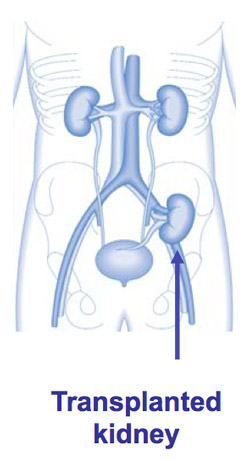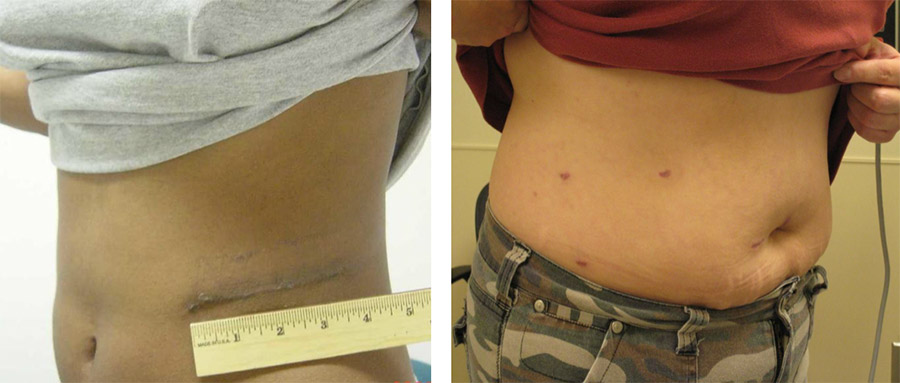Kidney transplantation
Intro

Image courtesy of The Kidney Foundation of Canada
For those who are eligible, kidney transplantation is the best option for treating kidney failure.
It involves a surgical procedure in which a donor kidney is implanted into the recipient’s abdomen. The kidney can come from a person who has died suddenly (deceased donor) or a living person (living donor).
Eligibility for kidney transplantation
- 1 in 10 patients on chronic dialysis will receive a transplant
- 1 in 100 patients will receive a transplant without requiring dialysis (pre-emptive)
Options for kidney transplantation
- If a living donor is available, transplant prior to starting dialysis may be possible
- Average wait time for Sunnybrook patients is 1-2 years
- Available to a select group of patients. You and your donor need to be carefully evaluated and this could take 6 – 12 months
- If a living donor is not available, then assessment for transplant can only begin after starting dialysis
- Average wait time for Sunnybrook patients is 3-7 years
Ontario government’s reasons for kidney transplantation ineligibility
- Some conditions will prevent you from receiving a kidney transplant such as but not limited to:
- Uncorrectable cardiac or peripheral vascular disease
- Certain cancers
- Uncorrectable psychiatric condition or cognitive impairment
- Severe uncorrectable impaired physical condition
- Short life expectancy
Why might I consider transplantation?
- No more dialysis required
- No need to follow dialysis schedule
- Less restrictions on diet and fluid
- Improved quality of life – feel healthier
- Fewer hospitalizations
- Lower risk of heart attack and stroke
- Overall, individuals with a kidney transplant live longer than those on dialysis
What are common risks for transplantation?
Potential complications include:
- Complications related to medications
- Acute rejection
- Chronic rejection
Learn more
1. Overview
"A transplant is a type of surgery where an organ or tissue is removed from one person (donor) and given to another (recipient) to replace the recipient’s damaged organ or tissue." -Trillium Gift of Life Network
- Sunnybrook is not a Transplant Centre
- Referral is made to Toronto General Hospital or St. Michael’s Hospital
- Most assessment tests are done at Sunnybrook and results are sent to transplant centre
- Appointments for medical and surgical review and education will be scheduled by transplant centre
2. Considerations
- No more dialysis required
- No need to follow dialysis schedule
- Less restrictions on diet and fluid
- Improved quality of life – feel healthier
- Fewer hospitalizations
- Lower risk of heart attack and stroke
- Overall, individuals with a kidney transplant live longer than those on dialysis
BUT:
- Transplant is not a cure
- Anti-rejection medications are needed as long as transplant is working
- Medications have side-effects
- Require regular blood and other tests, clinic visits to watch kidney function are needed
- Does not cure high blood pressure, high cholesterol, diabetes, heart disease or other pre-existing illnesses
- Only certain individuals are eligible – medical reasons why not
- If eligible 1 in 10 patients receive
- No age limit
3. Pre transplant assessment
Transplantation is possible only if individual is able to:
- Safely undergo transplant surgery
- Remain on lifelong anti-rejection medications
Assessment includes
- Blood tests
- Cardiac (heart) tests
- Testing for infectious diseases
- Chest x-ray, ultrasounds
- Screening for cancer
- Meetings with: nephrologist, transplant surgeon, anesthetist, transplant coordinator, social worker
- Other tests and appointments as necessary
Blood group and antibodies
- Part of the transplant assessment includes checking for blood group and certain antibodies
- These are important factors to determine if a kidney is suitable
Blood group compatibility
| Donor | |||||
|
Recipient |
A | B | AB | O | |
| A | ✔ | X | X | ✔ | |
| B | X | ✔ | X | ✔ | |
| AB | ✔ | ✔ | ✔ | ✔ | |
| O | X | X | X | ✔ | |
| Note: RH group (+/-) does not matter | |||||
Antibodies
- Everyone makes antibodies to fight off infections
- Some antibodies may make it difficult to find a suitable kidney
- Tests are done to measure the presence of these antibodies
- Pregnancy, blood transfusions and previous transplants increase the likelihood of developing these antibodies
4. Types of kidney transplant
Deceased donor
- Is only available after dialysis treatments have begun
- Average wait time stats for Sunnybrook patients is 3-4 years
Living donor
- Is available before or after dialysis treatments have begun
- Average wait time stats for Sunnybrook patients is 1-2 years
Combined kidney & pancreas
- Is available for some individuals with diabetes
Deceased donor transplantation
- Wait time varies from 1 – 10 years
- Average wait time stats for Sunnybrook patients is 3-4 years
- Wait time starts from first day of dialysis
- Wait time is influenced by blood type and ability to find a suitable match
Living donor transplantation
Donor must:
- Be in excellent health
- Have normal kidney function
- Have normal blood pressure or easily-controlled high blood pressure
- Not have diabetes
- Donor is assessed by a nephrologist different from recipient
- Risk for approved donors is low
- If there are matching and blood type concerns, transplantation may still be possible
- Living donor transplant is better than deceased donor
- Average wait time stats for Sunnybrook patients is 1-2 years

Left: mini incision, right: laparoscopic
Paired exchange transplantation
- Find pairs where living donors cannot donate to intended recipients due to antibodies or blood group
- Match up pairs so donor from one pair is compatible with recipient from other pair
- Two pairs exchange kidneys
- Each recipient receives a living donor kidney
- Operations take place at the same time
- Can also have exchanges which involve 2 or more pairs
- Difficult to find matching pairs within one hospital
5. Transplant surgery and follow-up
Surgery
- Generally, native kidneys remain in place
- Incision is about 6” (15 cm) long in lower abdomen
- In hospital for 7 – 10 days
- Usually longer with a deceased donor kidney
- Dialysis may be required in the short term, before kidney starts working well
- More common with deceased donor kidney
- First 48 hours spent in “step-down” unit, then move to a regular room
- Before going home the following will be confirmed:
- Kidney working well and pain is controlled
- Eating and drinking normally
- Medication and self-management teaching completed
- Follow-up is scheduled
- Follow-up:
- Frequent lab tests at transplant centre initially
- First clinic visit 1 – 2 weeks after discharge
- By one year post-transplant
- Labs once/month or less
- Clinic every 3 – 4 months or less
6. Kidney transplantation support
- Ongoing communication as needed with transplant kidney team at Sunnybrook during workup
- Group and one-on-one education sessions with social worker and/or coordinator of the transplant kidney team at the transplant centre/hospital
- Regular clinic visits with your transplant kidney team at the transplant centre/hospital after your transplant
- Peer support is available from patients that were donors and those that were recipients
7. Summary
- Overall, people with a kidney transplant live longer than people on dialysis
- Living donor transplant is better than deceased donor
- Transplant team provides further education and support in decision making






